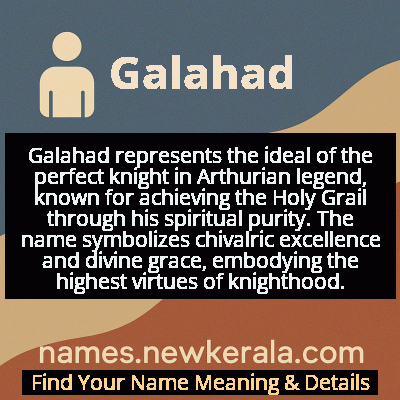Galahad Name Meaning & Details
Origin, Popularity, Numerology Analysis & Name Meaning of Galahad
Discover the origin, meaning, and cultural significance of the name GALAHAD. Delve into its historical roots and explore the lasting impact it has had on communities and traditions.
Name
Galahad
Gender
Male
Origin
Arthurian
Lucky Number
7
Meaning of the Name - Galahad
Galahad represents the ideal of the perfect knight in Arthurian legend, known for achieving the Holy Grail through his spiritual purity. The name symbolizes chivalric excellence and divine grace, embodying the highest virtues of knighthood.
Galahad - Complete Numerology Analysis
Your Numerology Number
Based on Pythagorean Numerology System
Ruling Planet
Neptune (Ketu)
Positive Nature
Intuitive, analytical, spiritual, and inquisitive.
Negative Traits
Secretive, reserved, aloof, and can be overly critical.
Lucky Colours
Green, yellow.
Lucky Days
Monday.
Lucky Stones
Cat’s eye, moonstone.
Harmony Numbers
1, 5, 6.
Best Suited Professions
Scientists, researchers, spiritual leaders, detectives.
What People Like About You
Depth of knowledge, analytical skills, spirituality.
Famous People Named Galahad
Sir Galahad
Arthurian Knight
Achieved the Holy Grail as the purest knight of the Round Table
Galahad Threepwood
Literary Character
Prominent character in P.G. Wodehouse's Blandings Castle series
Galahad of Camelot
Legendary Hero
Son of Lancelot and Elaine of Corbenic, perfect knight of Arthurian lore
Name Variations & International Equivalents
Click on blue names to explore their detailed meanings. Gray names with will be available soon.
Cultural & Historical Significance
The cultural impact of Galahad extends beyond medieval literature into modern interpretations of chivalry and heroism. He represents the archetype of the 'pure hero' whose virtue is innate rather than earned, setting him apart from other Arthurian figures who struggle with human flaws. This portrayal has influenced Western concepts of idealism, spiritual knighthood, and the pursuit of perfection, making him a enduring symbol of uncompromising virtue in the face of worldly temptations and challenges. His character has shaped how subsequent generations understand the relationship between martial prowess and spiritual devotion, creating a template for the 'holy warrior' archetype that appears throughout Western literature and mythology.
Extended Personality Analysis
Galahad is characterized by his exceptional purity, unwavering moral integrity, and spiritual devotion. Unlike other Arthurian knights who must overcome personal flaws, Galahad is portrayed as inherently perfect from his youth, possessing a natural inclination toward virtue that makes him uniquely qualified for the Grail Quest. His personality combines fierce martial prowess with deep spiritual sensitivity, creating a knight who is both formidable in battle and profoundly connected to divine purpose. This combination makes him both admired and somewhat distant from his fellow knights, as his perfection sets him apart from ordinary human experience.
His traits include extraordinary humility despite his abilities, unwavering focus on spiritual goals, and a sense of destiny that guides his actions. Galahad demonstrates compassion and wisdom beyond his years, often serving as a moral compass for other characters. However, his perfection also carries a sense of melancholy, as his spiritual calling separates him from worldly attachments and ordinary human relationships. This creates a complex personality that balances divine purpose with human isolation, making him both an inspirational figure and a somewhat tragic one in his inability to fully participate in mortal concerns. His character represents the ideal of someone who remains uncorrupted by the world while actively engaging with it for higher purposes.
Modern Usage & Popularity
In contemporary times, Galahad remains a recognizable though uncommon name, primarily used by parents seeking a name with Arthurian heritage and noble connotations. Its usage peaked during the Victorian revival of interest in Arthurian legends and has maintained a steady, if rare, presence in English-speaking countries. The name appeals particularly to those valuing literary tradition and chivalric ideals, though its strong association with perfection can make some parents hesitant. Recent years have seen a slight increase in usage as vintage and mythological names gain popularity, but it remains far less common than other Arthurian names like Arthur or Lancelot. It's often chosen by families with interest in medieval literature, history, or those seeking a name that conveys strength, purity, and heroic ideals without being overly common or trendy.
Symbolic & Spiritual Meanings
Galahad symbolizes ultimate spiritual purity, divine grace, and the achievement of impossible ideals. As the Grail Knight, he represents the human capacity for perfection when guided by faith and moral certainty. His story serves as a metaphor for the spiritual journey toward enlightenment, where external challenges are secondary to internal purity. The character embodies the concept of predestined greatness and the idea that some individuals are born with a sacred purpose that transcends ordinary human experience. Symbolically, Galahad stands for uncompromising virtue, the pursuit of higher truths, and the sacrifice of worldly pleasures for spiritual fulfillment. His eventual ascension to heaven with the Grail reinforces his role as a bridge between earthly chivalry and divine grace, making him an enduring symbol of hope for human perfectibility and the possibility of achieving transcendent goals through unwavering dedication to principle.

